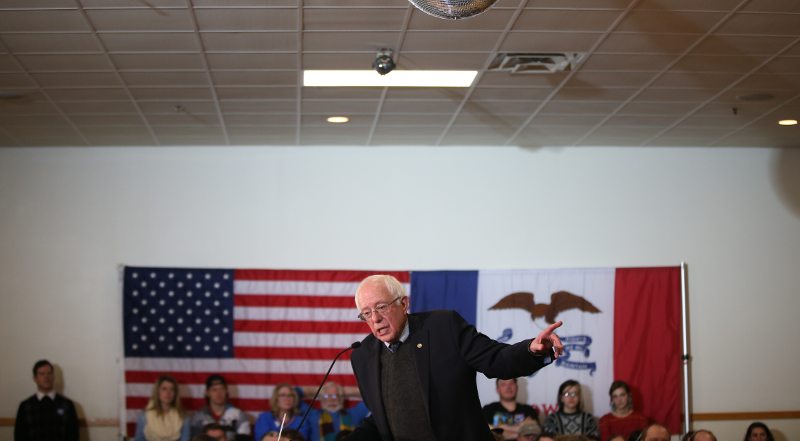Hello, I'm Will Jordan and welcome to The Pulse.
The Pulse is a weekly newsletter YouGov has launched ahead of the 2016 primaries and general election to give readers a one-stop-shop for the latest polling-related news from the campaign.
In addition to YouGov’s own extensive coverage of the election, The Pulse gives you the five things you need to know about the state of the campaign each week (and one you don't need to know but we think is worth knowing anyway!).
- Trump is still leading
At least in national polls, New Hampshire primary (Feb. 9) polls and some Iowa polls. Recent surveys in Georgia (Mar. 1) and Florida (Mar. 15) also show Trump with double-digit leads. Many pundits have been warning for months that the picture presented by polling was premature; when January arrived and people thought seriously about picking a president Trump's support would fade. It could still happen – but we’re 11 days from the Iowa caucus and Trump is still ahead.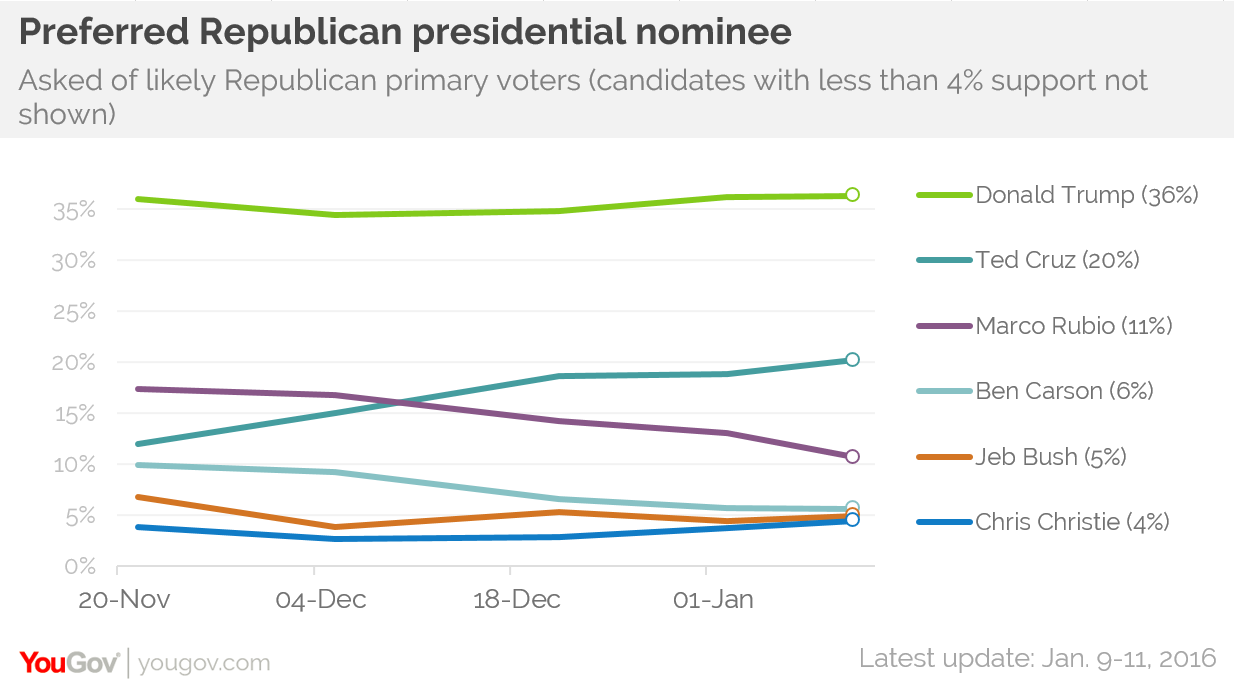 FiveThirtyEight have launched two projections for either party in each early state, including a “polls-only” projection and a “polls-plus” projection taking into account other factors, such as endorsements. Iowa, where Cruz has a 51% “polls-plus” chance of winning, is the only place where Trump doesn’t have the best odds. Only in the New Hampshire and South Carolina “polls-only” forecasts, however, are Trump’s odds over 50%.
FiveThirtyEight have launched two projections for either party in each early state, including a “polls-only” projection and a “polls-plus” projection taking into account other factors, such as endorsements. Iowa, where Cruz has a 51% “polls-plus” chance of winning, is the only place where Trump doesn’t have the best odds. Only in the New Hampshire and South Carolina “polls-only” forecasts, however, are Trump’s odds over 50%.
Read more about the thinking and methodology behind the forecasts here. - Don’t count out Rubio/Bush/Christie/Kasich – even if they lose Iowa and New Hampshire
Ted Cruz is first or second in all recent Iowa and South Carolina polls. Several pundits have declared it a “Trump-Cruz” race. But Cruz is getting hit hard – by Trump’s birther attacks and now, an explicit anti-endorsement by popular Iowa Gov. Terry Branstad. Meanwhile Trump has reportedly won the endorsement of Sarah Palin, who was viewed favorably by two-thirds of Republicans as recently as last February.
Another interesting challenge to the Trump-Cruz narrative is a wonderful new analysis by FiveThirtyEight and the Cook Political Report who took a hard look at how demographics and the primary’s complicated delegate rules shape the primary season.
The two most important points: (1) the primary season is front-loaded with states that are a more natural fit for Trump and Cruz, including states with lots of evangelicals like Iowa as well as a raft of Southern states in the Mar. 1 “SEC Primary”; (2) except for South Carolina these early contests grant delegates proportionally – meaning neither Cruz nor Trump can easily mount an unbeatable lead. On March 15th, winner-take-all primaries in Ohio and Florida could give someone like Kasich, Rubio or Bush a chance to notch narrow wins that propel them back into contention in the delegate count. The graphic below charts such a scenario for Rubio: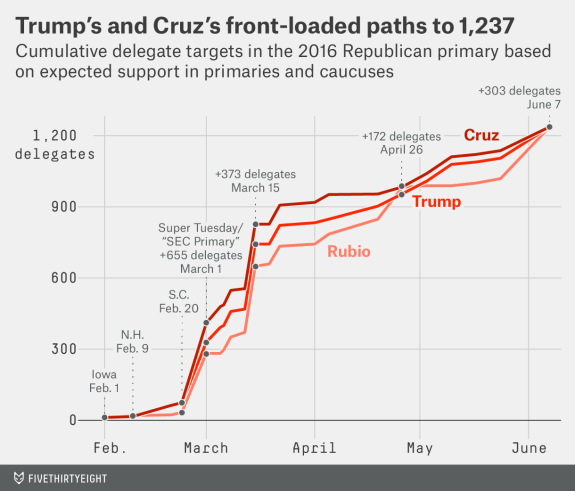 The whole analysis is worth a look.
The whole analysis is worth a look. - There’s still time for surprises
This also applies to the Democrats, who are discussed more below. Nate Cohn of the Upshot discussed the preponderance of late surges and sudden collapses in even the very recent history of early state primaries and caucuses. As the fantastic chart below demonstrates, even up to where we are now – just over 10 days before Iowa – the outcome is far from decided.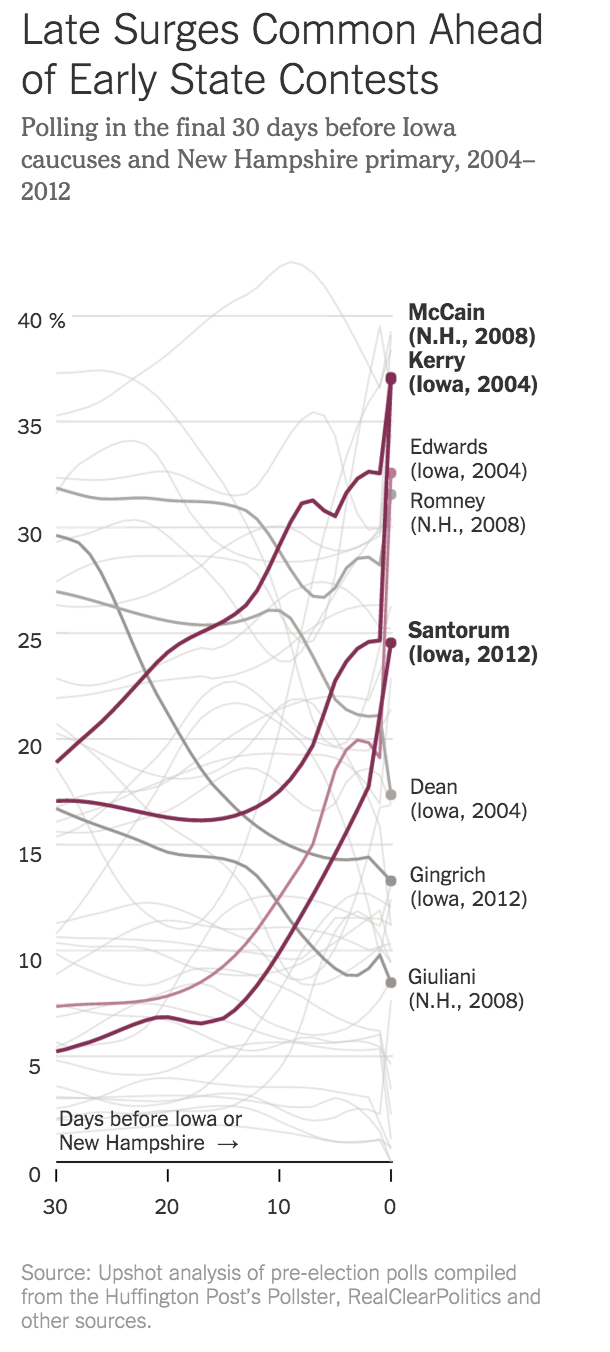 As FiveThirtyEight’s Harry Enten has noted on Twitter, the Democratic primary in Iowa changed rapidly in 2004 when the two frontrunners (Howard Dean and Dick Gephardt) began hitting each other hard – not unlike Trump and Cruz are doing now. But here’s a compelling case from Upshot editor David Leonhardt on why 2016 is different from all other recent elections.
As FiveThirtyEight’s Harry Enten has noted on Twitter, the Democratic primary in Iowa changed rapidly in 2004 when the two frontrunners (Howard Dean and Dick Gephardt) began hitting each other hard – not unlike Trump and Cruz are doing now. But here’s a compelling case from Upshot editor David Leonhardt on why 2016 is different from all other recent elections.
- Feeling the Bern
Speaking of surprises (and echoes of elections past) the Democratic primary is also tightening. Recent polls have put Bernie Sanders well within striking distance of Hillary Clinton in Iowa, and he’s widened his lead in New Hampshire – and that's even before you get to the stunner of a New Hampshire poll that showed Sanders leading by a massive 27 points yesterday. It's an outlier for now. Here's Iowa: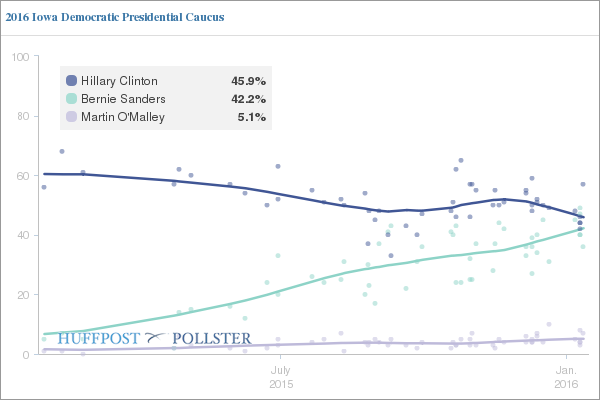 Clinton didn’t make any obvious stumbles in Sunday’s Democratic primary debate, and launched an effective attack on her opponent’s voting record on guns, but she also didn’t do anything to obviously dent Sanders’s momentum. It's no longer a very remote possibility that Clinton, long viewed as the presumptive nominee, loses the first two primary contests.
Clinton didn’t make any obvious stumbles in Sunday’s Democratic primary debate, and launched an effective attack on her opponent’s voting record on guns, but she also didn’t do anything to obviously dent Sanders’s momentum. It's no longer a very remote possibility that Clinton, long viewed as the presumptive nominee, loses the first two primary contests. - Feeling that young, liberal, white Bern
As the FiveThirtyEight projections make clear, the Democratic early states are not in the bag for anyone any more than the GOP contest. In New Hampshire, Clinton (who has lots of endorsements in the state) has 53% odds in the polls-plus despite only 27% in polls-only – as much a testament to the potential volatility of the race as anyone’s strength.
Another, perhaps deeper concern among Sanders supporters should be that his growing support comes disproportionately from groups with which he has always been strongest – whites, liberals, and young people – rather than those with which he must improve to compete in the less white, less liberal states that vote after Iowa and New Hampshire. Here is a demostration of how Sanders's support broke down in last week's national YouGov poll: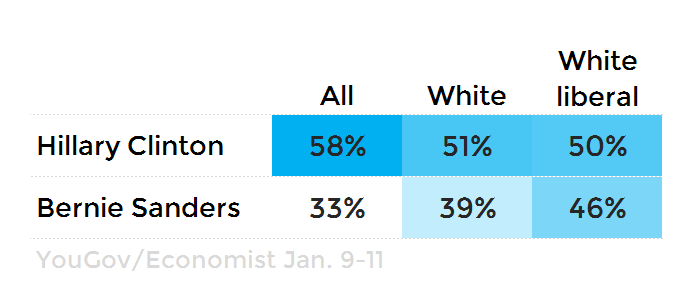 The Fix blog at the Washington Post also demonstrate this using a newly-released national Monmouth poll. Clinton’s lead among white Democrats has shrunk since December; it’s grown with Hispanics and African Americans.
The Fix blog at the Washington Post also demonstrate this using a newly-released national Monmouth poll. Clinton’s lead among white Democrats has shrunk since December; it’s grown with Hispanics and African Americans.
If Sanders wins in Iowa and New Hampshire, the momentum could help him expand his appeal before the Nevada (Feb. 20) and South Carolina (Feb. 27) contests, where Hispanic and black voters will play a major role. But there are few signs he is doing so already.And finally...Vintage birtherism
While fielding our recent Republican primary poll we also asked a series of questions about “birtherism”, which re-emerged with Trump's allegations that Cruz may be ineligible. Most Republicans say Cruz is eligible. But 53% of likely Republican primary voters doubt that President Obama was born in the United States, while 24% believe he was and 23% are unsure. Here are those voters broken down by who they would support in the primary: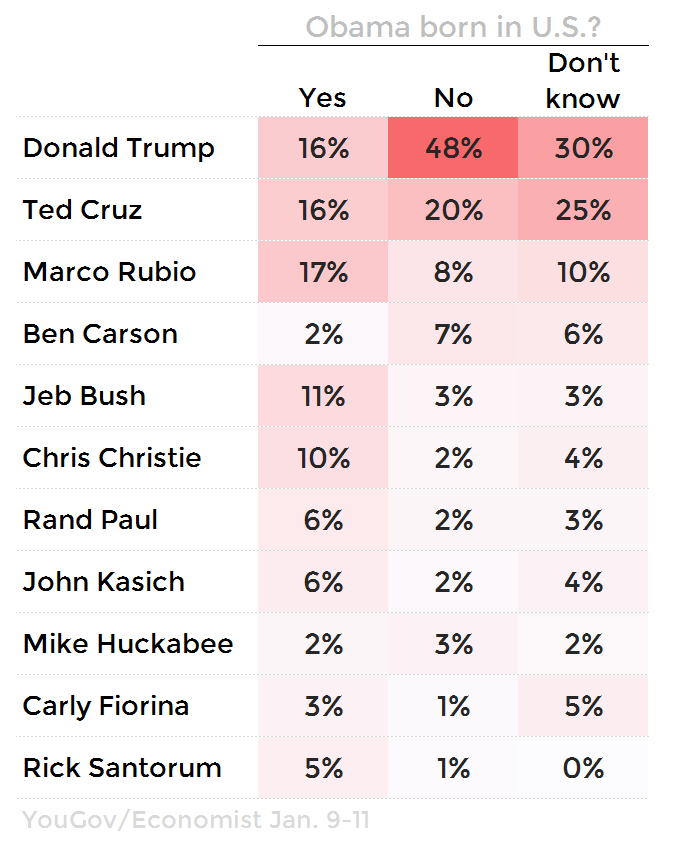
Look out for several new YouGov poll in the coming days – including a national YouGov/Economist Poll along with (on Sunday) the latest installment of the CBS News/YouGov Battleground Tracker, which polls early states.
Here is the schedule for the initial voting:
Monday, February 1: Iowa caucuses
Tuesday, February 9: New Hampshire
Saturday, February 20: Nevada caucus (Dem); South Carolina (GOP)
Tuesday, February 23: Nevada caucus (GOP)
Saturday, February 27: South Carolina (Dem)
Follow Will on Twitter
